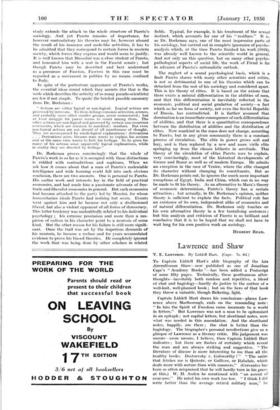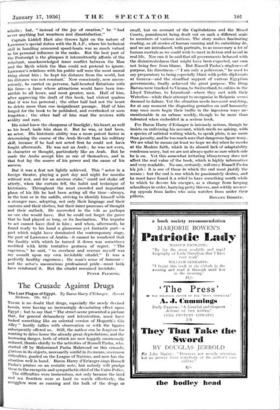Lawrence and Shaw
T. E. Lawrence. By Liddell Hart. (Cape. 7s. Gd.)
To Captain Liddell Hart's able biography of the late Aircraftsman Shaw—now published as one of Jonathan Cape's " Academy Books "—has been added a Postscript of some fifty pages. Technically, these posthumous after- thoughts—inevitably both random and repetitive, a blend of chat and hagiology—hardly do justice to the author of a well-knit, well-planned book ; but on the hero of that book
they throw a valuable, though flickering, light. '
Captain Liddell Hart draws his conclusions—places Law- rence above Marlborough, ends on the resounding note : " In him the Spirit of Freedom came incarnate to a world in fetters." But Lawrence was not a man to be epitomised in an epitaph ; not capital letters, but shorthand notes, were what was needed in this emendation. And the shorthand notes, happily, arc there ; the chat is better than the hagiology. The biographer's personal recollections give us a glimpse of Lawrence as a literary critic. His judgement was unsure—more unsure, I believe, than Captain Liddell Hart indicates ; but there are flashes of certainty which reveal the man and are always striking and suggestive. " The literature of disease is more interesting to me than all the healthy books. Dostoevsky r. Galsworthy ! " ".The satire that fetches me is Quixote, or Gulliver, or Rabelais, which deals more with nature than with manners." (Cervantes has been so often mispraised that he will hardly turn in his grave at this.) W. H. Auden • he mentioned with • " an • accent of near-awe." He rated his own work too low. " I think I did write better than the average retired military man," he
admits ; but, " instead of the joy of creation," he " had never anything but weariness and dissatisfaction."
Captain Liddell Hart also throws light on the nature of Lawrence's special duties with the R.A.F., where his technical skill in handling armoured speed-boats was as much valued as his personal influence in the ranks. But the best part of the Postscript is the glimpses it intermittently affords of the reluctant, unacknowledged inner conflict between the Man and the Myth which the Man could not pretend to ignore. Lawrence's relations with his public self were the most unreal thing about him ; he kept his distance from the world, but his distance was not constant: Now consciously, now uncon- sciously, he carried on perverse, half-hearted flirtations with his fame—a fame whose attractions would have been irre- sistible to all lesser, and most greater, men. Half of him, after approving the draft of this book, had violent qualms that it was too personal ; the other half had not the heart to delete more than one insignificant passage. Half of him longed for the book to be published, and overlooked or soon forgotten ; the other half of him read the reviews with avidity and care.
His mind knew the cheapness of limelight; his heart, as well as his head, bade him shun it. But he was, or had been, an actor. His histrionic ability was a more potent factor in determining the course of the Arab Revolt than his military skill, because if he had not acted first he could not have fought afterwards. He was not an Arab ; he was not even, in character or thought, particularly like an Arab. But he made the Arabs accept him as one of themselves, and in that feat lay the source of his power and the cause of his success.
But it was a feat not lightly achieved. This " actor in a foreign theatre, playing a part day and night for months without rest, and for an anxious stake," could not shake off utterly, when the curtain fell, the habit and technique of histrionics. Throughout the most crowded and important phase of his life he had been acting all the time—always, in the tent or in the saddle, striving to identify himself with a stranger race, adopting, not only their language and their customs and their clothes, but their inner processes of thought and their outlook. He succeeded in the role as perhaps no one else would have. But he could not forget the game that he had played so long, or its fascination. The impulse to act cannot have died in him ; and when, afterwards, he found ready to his hand a glamorous yet fantastic part—a part which might have dominated the contemporary stage, the part of Lawrence of Arabia—it cannot be wondered that the finality with which he turned it down was sometimes modified with little tentative gestures of regret. " The eagerness," he said, " to overhear and oversee myself was my assault upon my own inviolable citadel." It was a perfectly healthy eagerness ; the man's sense of humour— and the actor's unconscious professional pride—must both have reinforced it. But the citadel remained inviolate.
PETER FLEMING.







































 Previous page
Previous page